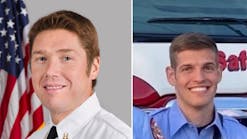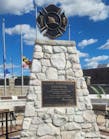Recovery operations continue in mid-April at the World Trade Center site. In March, the remains of 55 firefighters were recovered from many levels below grade in the continuing effort to return all firefighters to their families. More of the firefighters are being identified through DNA analysis.
Many of the replacement apparatus for the rigs destroyed after the collapse of the trade center have started to be delivered. Many of these new rigs and those still in service have unique memorials honoring their departed firefighters.
The funerals and memorial services continue. As the recovery process winds down, many firefighters have sought to speak with their brother and sister firefighters or to seek help from counselors. Critical incident stress debriefing is critical for the health of the thousands who had to go through horrific efforts day in and day out to search for, recover and then attend services for their friends, relatives and co-workers. For the past few months the nation, and the world have been looking at the FDNY and all firefighters in a new light. Held on a pedestal, they shine like the brightest star.
The terrorist attacks partially crippled a resilient nation. Times are tough for American business and the economy. I remember after the terrorist bombing in Oklahoma City in 1995, the city's government wanted to reduce the fire department budget. How could that have been possible? Well, history repeats itself. In New York City the new mayor wants to formulate a contingency spending plan to reduce a budget gap. Apparently, the idea is to shut down 10 engines companies that are located in firehouses with other units in slow areas. Just last September, every company in a wide geographic area was needed to assist FDNY when almost all of its available apparatus were committed. A once-in-a-lifetime event? We hope and pray so. But the threat is as real today as it was in September. The fire service is the nation's first line of defense, but I suppose some bean counter now figures we don't quite need them anymore.
The federal government has earmarked billions of dollars for homeland defense, including money that the fire service has been asking for all along - especially long before 9/11. Now, I read that the money may go to the states to disperse as they see fit, and not to the local jurisdictions. When it comes to splitting the big federal money pie, everyone wakes up and gets into the act. We've been through this many times before.
As I write this, I am preparing to attend the 14th Annual National Fire and Emergency Services Dinner in Washington, D.C., hosted by the Congressional Fire Services Institute. President George W. Bush was the scheduled keynote speaker. I'm very interested to learn about the President's views in regard to these federal appropriations. We'll report next month on the outcome, if any.
We continue our World Trade Center coverage with an interview with Battalion Chief John Norman, chief in charge of the FDNY Special Operations Command. John replaces Chief Ray Downey, a longtime friend and Firehouse Expo speaker who was lost to us on 9/11. Ray was a "class guy," a gentleman and a dynamic individual. He will truly be missed. Chief Norman will discuss "Rescue and Recovery Efforts at the World Trade Center" at the Firehouse Expo 2002 in Baltimore, July 16-21. More in-depth coverage of 9/11 will continue in upcoming issues.
Generosity abounds across the nation as at least 13 pieces of apparatus are going to be built to FDNY specifications and donated to the department. One amazing story of a debt that was repaid to the FDNY after 134 years is reported by Paul Hashagen on page 38.
The fire service never forgets; it's too bad that it is eight months after the fire service's worst disaster and some people have already forgotten. A damn shame.





